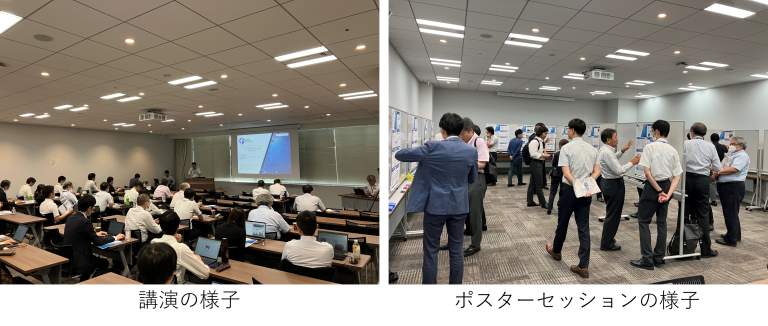<Summary>
●The Carbon Recycling Fund (CRF), a general incorporated association, uses donations from its members as a source to provide approximately 100 million yen per year in research grants related to carbon recycling, in hopes of producing research results that will contribute to achieving carbon neutrality in 2050.
●A report meeting on the results of 16 projects selected for research grant activities in FY2022 was held on September 13th, with about 50 people participating in the venue and about 100 people online, and members and researchers participated in a question-and-answer session and a poster session. Promote mutual exchange and matching.
●16 new proposals have been adopted for research grant activities in 2023, and research will begin in August.
Carbon Recycle Fund (CRF), a general incorporated association, was established in August 2019 with the aim of realizing a circular carbon society by supporting the social implementation of carbon recycling, which is the key to achieving carbon neutrality in 2050, and currently has over 180 companies. ・It functions as a cross-industry, industry-academia-government collaboration platform consisting of individuals, local governments, and academic institutions.
CRF collects donations from its members every year, and grants up to 10 million yen (approximately 100 million yen in total) to researchers (research teams) with ideas related to carbon recycling in the hope of achieving results that will contribute to carbon neutrality in 2050. We provide research grants.
Research grants for fiscal year 2022 will begin in August 2022, and a results report meeting will be held for CRF members on Wednesday, September 13, 2023, approximately one year later. Approximately 50 people attended at the venue and approximately 100 people attended online.
At the beginning, CRF Managing Director Hashiguchi stated that renewable energy alone is not enough to achieve carbon neutrality, and that we need to use wisdom to continue to utilize fossil resources, which are hydrocarbon compounds. One of the challenges is to build a “recycling carbon society” that utilizes CO2 as a resource through innovation, and it was stated that the role of CRF is becoming increasingly important.
In the results report, presentations focused not only on research results but also on issues for social implementation and collaboration with CRF members, and there was a lively Q&A session both online and at the venue.
In addition, the presenters expressed their gratitude for the “selection that emphasizes the ideas of individual researchers, not just their achievements,” and “the highly flexible use of the grant.”
The poster session that followed the report of the results had a lively face-to-face discussion and exchange of opinions, promoting interaction between CRF members and researchers, and serving as a place for researchers and member companies to meet.
We have adopted 16 new research proposals for research grant activities in 2023, and research has begun at each research institution from August. CRF will continue to carry out this research grant activity in the future, accelerating efforts to discover and train researchers involved in carbon recycling and to implement it in society.

Photo 1 Scene from the results report meeting
<Characteristics of CRF’s research grant activities>
● This is a system that provides grants to researchers (research teams) for research related to a wide range of carbon recycling, including negative emission fields such as the use of CO2 absorption sources, and social science.
● This is a unique subsidy system that is funded by donations from members.
● The grant amount will be approximately 10 million yen per project, the research period will be within two years, and the total amount will be approximately 100 million yen per year.
● We place emphasis on originality, innovation, and superiority over conventional technology, and evaluate ideas with more emphasis than on actual results.
● To date, there has been an increasing number of cases in which projects have been selected for NEDO projects, Green Innovation Funds, etc., and have led to joint research with private companies.
● Rights such as research results and patents belong to the researchers.
● In 2020, 12 out of 35 projects were adopted, and in 2021, 12 out of 46 were adopted. In 2022, we implemented new initiatives such as creating a startup slot, and selected 16 out of 84 applications for the general open recruitment slot and startup slot.
● Continuing from 2022, in 2023, we will continue to solicit applications for both general and startup positions, and 16 applications were selected out of a total of 87 applications.


